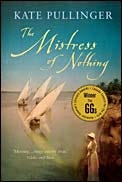Based on a true story, The Mistress of Nothing is about Lady Duff Gordon's lady's maid, Sally Naldrett, who in 1862 traveled to Egypt with her mistress. Lady Gordon was dying of tuberculosis. Her doctors hoped the hot, dry climate would relieve her symptoms. Her family members visited her in Egypt but did not stay; only Sally remained to assist Lady Gordon. After Sally had an affair with an Egyptian man and bore his child, Lady Gordon gave her permission to accept his marriage offer. According to Egyptian law, his existing marriage did not prevent him from taking a second wife. But then Lady Gordon dismissed Sally from her employ and insisted she leave the baby with her husband's first wife and return to England.
From this sketchy factual outline, Pullinger imagines the life on which history fails to enlighten us. In The Mistress of Nothing, Egypt itself is a seducer. "The night was very bright and when I looked up, I gasped out loud, then covered my mouth, hoping no one had heard. The moon was high over the Theban hills and the sky was blue and black and indigo, pricked out with stars.... I had never seen such beauty." In the intense, curative heat, Lady Gordon adopts Egyptian men's clothes. She gifts Sally, too, with loose, flowing Egyptian robes. "I ... looked at the gorgeous pile of fabric on the floor at my feet and, unable to speak, made a kind of involuntary noise in the back of my throat and, to my horror, began to cry."
In places, the story seems almost prophetic of events that occurred a couple of years after the novel’s publication. The two Englishwomen discover that Egyptians live under an oppressive government. Though the people "endure, like the Nile itself ... they lie in wait, like ... a crocodile among the reeds, and from time to time they rise up and they bite." This is Sally's story, though. She, like Egypt, learns to do more than simply endure. (2009; 250 pages, including an Author's Note briefly discussing the history behind the novel)




